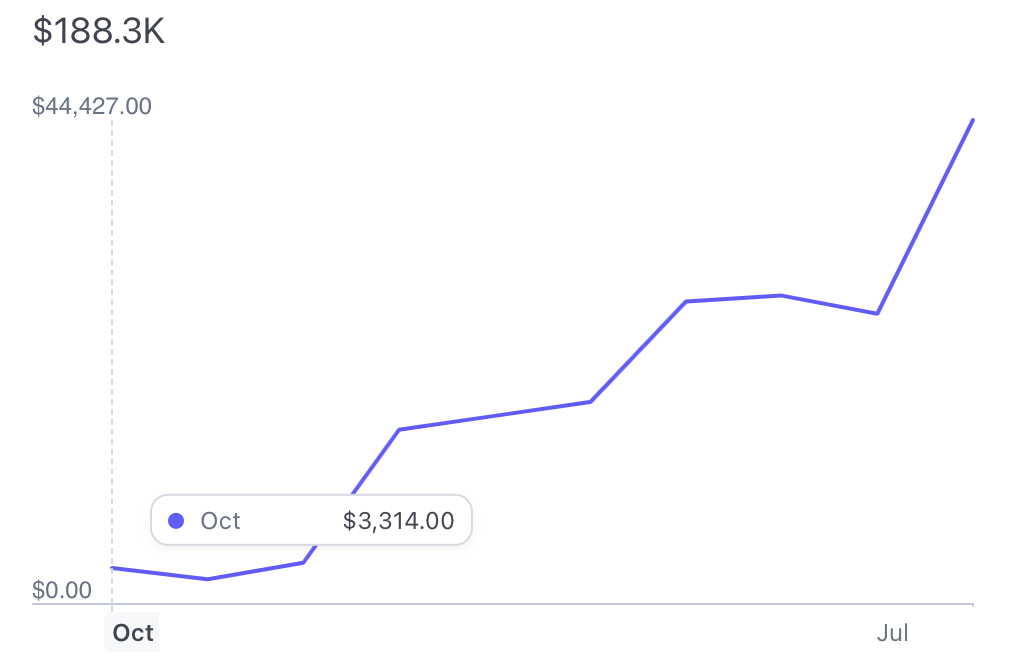Information is literally (and yes I do mean literally) at our fingertips every moment of every day, as long as you’re holding your phone.
But monetizing that information can be tough when it feels like everyone has it for free with a quick Google Search.
However, there are tons of people who love to have information organized in a single place and put together in a way that makes sense. This is what makes ebooks so amazing and why we love them as an offer for any Creator.
In fact, in our signature program, an ebook is the first offer that you start with because it just makes sense.
However, simply creating an eBook is not enough to guarantee success. In a saturated market, where countless eBooks are vying for attention, effective marketing strategies are crucial to stand out from the crowd and reach your target audience.
This is where eBook marketing comes into play.

eBook marketing encompasses a range of tactics and strategies aimed at promoting and selling your eBook to the right audience. It involves understanding your readers’ needs and desires, crafting compelling content, and leveraging various marketing channels to maximize visibility and engagement.
For solopreneurs and creators like you, eBook marketing is not just a means to generate sales and revenue, but also a powerful tool for building your personal brand and establishing yourself as an authority in your field.
When you have an ebook out in the market it lets people know that you are someone they can turn to about a topic.
By effectively marketing your eBooks, your can expand your reach, connect with your audience on a deeper level, and ultimately achieve you goals.
In this comprehensive guide, we’ll look at the various aspects of eBook marketing and provide solopreneurs and creators with actionable strategies to successfully promote your eBooks.
From defining your target audience and conducting market research to creating high-quality content and leveraging content marketing, we will cover all the essential steps to ensure your eBook reaches its full potential.

Preparing for eBook Marketing
You can’t just start marketing your ebook and the reason why is because you need to know who you are talking to. Otherwise it’s like owning a vegan deli and talking to people who love hotdogs.
Building an effective strategy before you do any marketing can get you off on the right foot. This involves defining your target audience, conducting market research, and setting clear goals.
By taking these preliminary steps, you can be sure that your marketing efforts are focused, and effective.
Defining Your Target Audience
One of the first steps in preparing for eBook marketing is defining your target audience. We like to call this the Hero.
Understanding who your ideal readers are will help you tailor your marketing strategies to reach them more effectively. While the general advice is to consider their demographics, in today’s world it’s more important to focus on psychographics.
Why?
Take a look at the people who love The Lord of the Rings as an example. It’s hard to define them by demographics as their backgrounds are varied. But they all have a love for fantasy.
In this case, the best thing you can do is understand who your audience identifies as.
Are you writing for young adults who enjoy fantasy novels? Or perhaps your eBook is targeted towards entrepreneurs looking for practical business advice.
By pinpointing your target audience, you can create content that resonates with them and increases the chances of converting them into loyal readers.

Conducting Market Research
Market research is an essential component of preparing for eBook marketing. It will help you gain valuable insights into the competitive landscape, identify trends, and understand the preferences of your target audience.
Basically, it helps you uncover opportunities and position your eBook in a way that stands out from the crowd.
Start by exploring existing eBooks in your niche.
Analyze their content, cover designs, and pricing strategies. Look for gaps in the market that you can fill with your unique perspective or expertise.
Consider reaching out to potential readers through surveys or online communities to gather feedback and understand their expectations.
Using Reddit for Research
One of the best places to do any type of research is Reddit. We use it for a large majority of our research because it’s where millions of people gather to openly share their thoughts and opinions (this can obviously be bad if you’re on the wrong subreddit).
Whatever your book topic is you can find a subreddit on it. From there you can read the posts and comments to get an idea of what your audience likes, dislikes, has trouble with, and what outcome they want.
For example, if you’re a fantasy writer and you wanted to write some Progression Fantasy then the Progress Fantasy subreddit is a perfect place to understand what works and what doesn’t amongst that crowd.
Using ChatGPT for Market Research
ChatGPT, when prompted well, can be a great tool for doing market research. It doesn’t replace Reddit research or other places you might use like Quora and social media, but it can be a great place to start before you go out to those other platforms and start digging around.
Here’s how I get started:
Setting Clear Goals
Setting clear goals is crucial for any successful marketing campaign, and eBook marketing is no exception.
Clearly define what you want to achieve with your eBook and establish measurable objectives.
Are you aiming to increase eBook sales, build brand awareness, or establish yourself as an authority in your niche? Having specific goals in mind will guide your marketing efforts and help you track your progress.
When setting goals, it’s essential to be realistic and consider the resources at your disposal. For instance, as a solopreneur with limited time and budget, your goals will differ from those of a larger publishing company.
By aligning your goals with your resources, you can develop targeted strategies that maximize your chances of success.
Creating and Optimizing Your eBook
Once you have identified your target audience and conducted thorough market research, it’s time to delve into the exciting process of creating and optimizing your eBook.
This step will determine the success of your eBook marketing efforts and ensure that your masterpiece reaches its intended audience.

Crafting a Compelling Title and Cover Design
The first impression is often the most lasting one, and this holds true when it comes to eBooks.
A compelling title and eye-catching cover design can make all the difference in capturing the attention of potential readers. With the right title and cover design, you can entice readers to click, explore, and ultimately purchase your eBook.
When crafting a title, it’s essential to choose words that resonate with your target audience and accurately reflect the content of your book. A well-crafted title should be concise, captivating, and memorable.
Consider incorporating keywords that are relevant to your niche to optimize your eBook for search engine visibility.
Equally important is the cover design.
A visually appealing cover can be the deciding factor for a reader considering whether to click on your book or move on. Invest in professional design services or leverage eBook cover design tools to create a cover that stands out amidst the sea of digital books.
Be sure to choose images, fonts, and colors that align with your book’s genre and theme.

Writing High-Quality Content
Once you have captured your reader’s attention with an enticing title and cover design, you must deliver on the promise of your eBook’s content.
High-quality writing is the backbone of any successful eBook. Your writing should be engaging, informative, and well-structured to keep readers hooked from beginning to end.
To achieve this, start by outlining your eBook and organizing your ideas into coherent chapters or sections. Each chapter should flow seamlessly into the next, guiding readers through a captivating narrative or providing valuable information.
Use clear and concise language to convey your message effectively, and sprinkle your writing with vivid descriptions and anecdotes to bring your content to life.
Don’t forget the power of thorough editing and proofreading.
Polishing your eBook for grammar, punctuation, and spelling errors will ensure a professional finish. Consider hiring a professional editor or enlisting the help of beta readers to provide valuable feedback before finalizing your eBook.
You can find a lot of editors on freelance marketplaces like Fiverr and Upwork.
You can also use ChatGPT to make this whole process way easier. You can learn the steps in the 12 Hour eBook Method.
Formatting for Different eBook Platforms
In the vast digital landscape, eBooks are read on various devices and platforms. To reach a broader audience, it’s essential to format your eBook for compatibility across different platforms.
By optimizing your eBook’s formatting, you can provide a seamless reading experience for readers on devices ranging from e-readers to tablets and smartphones.

Start by selecting the appropriate eBook file format, such as EPUB or MOBI or PDF, depending on the platforms you intend to target. Consider using eBook creation software or platforms that offer formatting options tailored to specific devices.
These tools often provide templates and guidelines to help you optimize your eBook’s layout, fonts, spacing, and image placement.
Remember to test your eBook on different devices or use emulators to ensure that it displays correctly across platforms. This includes checking for proper text alignment, page breaks, and image rendering.
A well-formatted eBook enhances the reading experience and showcases your professionalism and attention to detail.
Creating and optimizing your eBook is a labor of love, demanding careful consideration and meticulous execution.
By crafting a compelling title and cover design, writing high-quality content, and formatting your eBook for different platforms, you set the stage for success in the competitive eBook market.
So dive in, unleash your creativity, and watch as your eBook captivates readers around the world.
If you’re new to eBook creation, check out our comprehensive guide on how to create an eBook to kickstart your journey.
Building Your Platform
In the vast and ever-evolving landscape of eBook marketing strategies, building your platform is an indispensable step for solopreneurs and creators seeking success.
Creating a Website or Blog
This is obviously something that we are biased towards as we love to teach people how to create blogs. Blogs become long-term marketing that doesn’t have to feel like marketing.
A well-designed and user-friendly website or blog is an invaluable asset in today’s digital age. It serves as your online hub, where readers and potential customers can learn more about you, your eBooks, and your expertise.
What should be on the blog? Blog posts that will attract your Hero.
Look at the website as another place where people can dive into your world and get lost. Post images, rough drafts, outlines, or whatever else that allows people to feel as though they are in the book creation process with you.
If you’re writing non-fiction ebooks then a blog becomes even more important as it can help to establish your authority around a topic.
For example, take a look at our Blogging Library. With so much content around blogging, it makes sense that we have books and courses on blogging that people can trust.
Your book can cover a single Topic Cluster or multiple. Just know that with a blog, marketing your ebook becomes a lot easier.

Building an Email List
When it comes to eBook marketing, building an email list is cultivating a loyal community of readers and potential customers. By collecting email addresses from interested individuals, you can establish a direct line of communication and engage with them on a more personal level.
Your email list is where your audience can learn more from you and about you. It builds trust and community.
To build an email list, you’ll want to create some type of incentive for visitors to subscribe. Consider offering a free and valuable resource related to your niche as a lead magnet. By doing so, you provide value upfront and incentivize visitors to share their email addresses.
Use call-to-action (CTA) buttons leading to your lead magnet in your content to boost your email list growth. We like to have ours at the bottom of a post so that it doesn’t get in the way of the reading experience.
These CTA buttons can prompt visitors to subscribe to your newsletter, receive updates about new eBook releases, or gain access to exclusive discounts or promotions.
Engaging on Social Media Platforms
Social media isn’t just for cat videos and food pics—it’s a goldmine for eBook marketing. It’s where you can connect directly with your audience, build a community of loyal fans, and promote your eBooks like a pro.
First things first, pick the right platforms for your target audience. If your eBooks have a professional vibe, LinkedIn and Twitter might be your best bet. But if your content is more about visuals and creativity, Instagram and Pinterest are the way to go.
Once you’ve zeroed in on the right platforms, the key is to consistently share valuable content that your audience loves. Think sneak peeks of upcoming eBooks, behind-the-scenes shots of your writing process, or discussions that spark interest in your niche.
Engaging with your audience through comments, likes, and shares helps build a community and encourages them to spread the word about your content.
Don’t forget about the power of social media ads!
Platforms like Facebook and Instagram have awesome advertising tools that let you target specific groups based on demographics, interests, and behaviors. Crafting eye-catching ad campaigns can help you reach a broader audience and drive more traffic to your author website or eBook sales pages.
Building your author platform is a marathon, not a sprint. It takes dedication, consistency, and a willingness to adapt. By creating an engaging author website or blog, growing your email list, and being active on social media, you’re setting yourself up for success in the competitive eBook market.
So, dive in! Connect with your audience, show off your expertise, and watch your eBooks soar.
(For more tips, check out this post on social selling examples!)

Leveraging Content Marketing
The name of the game is pretty simple when it comes to ebook marketing. People either know you exist or they don’t.
If you don’t want to pay for ads then you’re left with creating content.
By creating valuable blog posts, engaging in guest blogging and collaborations, and utilizing social media content, you can enhance your eBook marketing strategy and boost your visibility in the online world.
Creating Valuable Blog Posts
Blogging is a powerhouse when it comes to content marketing. It’s your stage to flaunt your expertise, share valuable insights, and really connect with your audience.
When you’re crafting blog posts, always keep your audience’s needs and interests front and center. Address their pain points and offer helpful solutions—this is how you become their go-to expert in your niche.
To amp up the engagement, sprinkle in some visual elements like images, infographics, and videos. These visuals not only break up the text but also make your content more appealing and shareable. One of our go-to tools is MidJourney, which helps us create unique images (like the ones you’ve seen in this post) to enhance our blogs.
Don’t forget about SEO! Optimize your blog posts for search engines with relevant keywords and meta tags. This boosts your visibility in search engine results and attracts organic traffic to your site.
One of the most effective ways to leverage content marketing is by creating compelling and valuable blog posts. These posts serve as a platform for you to showcase your expertise, share valuable insights, and engage with your audience on a deeper level.
Guest Blogging and Collaborations
Guest blogging and collaborations are fantastic ways to broaden your horizons and reach new audiences. By writing guest posts for reputable sites and teaming up with industry experts, you can showcase your expertise to a whole new crowd.
Start by finding websites or blogs that your target audience loves and that accept guest posts. Pitch your ideas with a focus on the value your content will bring to their readers.
When guest blogging, make sure your content is unique, well-researched, and engaging. This not only builds your credibility but also encourages readers to check out your website or blog.
Collaborating with other creators or experts in your field can be a game-changer too. Combining your skills and knowledge can produce content that really resonates with a broader audience.
Plus, these collaborations can open doors to partnerships and cross-promotion opportunities.

Utilizing Social Media Content
social media is a powerhouse for content marketing. It’s where you can reach a massive audience and engage with your followers in a fun, interactive way.
Pick the social media platforms that best fit your target audience and make sure you’re consistently active on those platforms.
When it comes to social media content, think value and connection. Share snippets from your eBook, insightful quotes, and behind-the-scenes peeks to spark interest and curiosity.
Encourage your followers to interact with your posts through comments, likes, and shares. This boosts your reach and attracts new potential readers.
Visual content is a must! Eye-catching graphics, videos, and infographics grab attention and drive more engagement. Don’t forget to use relevant hashtags to make your content more discoverable.
By consistently posting high-quality content and engaging with your audience, you can build a loyal following and drive traffic to your eBook.
In summary, by crafting valuable blog posts, guest blogging, collaborating with others, and harnessing the power of social media, you can effectively promote your eBook and connect with your audience.
Always aim to provide value, engage genuinely with your followers, and optimize your content for search engines. A well-thought-out content marketing strategy can take your eBook marketing to new heights and help you stand out.
The Best eBook Marketing Strategies
Once you have created and optimized your eBook, it’s time to focus on implementing effective marketing strategies to ensure its success. In this section, we will explore various strategies that will help you launch, promote, and generate buzz around your eBook.

Launching Your eBook
While we don’t think that the launch of your eBook is a crucial moment that can make or break its success, it is a good idea to plan something that will make a bit of a splash.
Start by creating a sense of anticipation among your target audience.
You’ve been building an email list, so tease them with snippets of content, and behind-the-scenes peeks. Watching you create will help them feel like they are a part of this process and build a connection and excitement around your eBook.
Schedule a launch party week with fun events and challenges that will build excitement but also provide value to the audience. Let them see how this book is going to help improve their life once they get their hands on it!
By making your launch event engaging and interactive, you can create a memorable experience for your audience and generate buzz around your eBook.

Utilizing Email Marketing Campaigns
Email marketing is still one of the most effective ways to promote your eBook. Building an email list of interested readers is going to help you long-term success.
Start by offering a compelling lead magnet on your website or blog that entices visitors to subscribe to your newsletter. This could be a free chapter of your eBook, a valuable resource related to your eBook’s topic, or even an email challenge.
Don’t feel like you have to wait until you have a sizable email list to start craft engaging and personalized email campaigns to promote your eBook. Start right away.
No one on your email list knows how many people are on your email list! So there’s no reason to wait for a magic number to start promoting your book.
Send out teasers, behind the scenes looks, or even limited-time offers to your subscribers. Highlight the unique selling points of your eBook and emphasize the benefits readers will get from it.
Promoting with Social Media Advertising
social media platforms are a treasure trove for reaching and engaging with potential readers. To get your eBook noticed, think about using social media advertising.
Platforms like Facebook, Instagram, and TikTok offer powerful advertising tools that let you target specific demographics, interests, and behaviors.
Create eye-catching and compelling ad creatives that showcase the key features and benefits of your eBook. Use striking visuals, persuasive copy, and strong calls-to-action to grab your audience’s attention.
Play around with different ad formats—image ads, carousel ads, video ads—to see what clicks with your audience. Keep an eye on how your ads perform and tweak your campaigns to get the best bang for your buck.

Collaborating with Influencers
Teaming up with influencers in your niche can be a fantastic way to boost your eBook’s reach and gain credibility. Influencers have dedicated audiences who trust their recommendations, making them great allies in your marketing journey.
Find influencers who match your eBook’s topic and target audience. Reach out with a collaboration proposal that highlights what’s in it for them. This could be a commission on each sale, a free copy of your eBook, or exclusive access to future content.
Encourage influencers to share honest reviews, testimonials, or even run giveaways on their social media platforms. By tapping into the influence and reach of these trusted figures, you can connect with new audiences and boost your eBook’s visibility.

Measuring and Analyzing Results
Once you have launched your eBook and implemented your marketing strategies, it’s time to measure and analyze the results of your efforts.
This allows you to gain insights into the performance of your eBook and marketing campaigns, so that you can make informed decisions and iterate your strategies for better outcomes.
Tracking eBook Sales and Downloads
Keeping an eye on your eBook’s sales and downloads is crucial. This data gives you a clear picture of how well your eBook is doing in terms of generating revenue and reaching your target audience.
By monitoring these numbers closely, you can spot trends and patterns that help you fine-tune your marketing strategy.
There are various tools and platforms available to track eBook sales. Many eBook publishing platforms come with built-in analytics, letting you monitor sales and downloads right from their dashboards.

Analyzing Marketing Campaign Performance
Tracking your eBook sales is just one piece of the puzzle. It’s also super important to see how your marketing campaigns are performing. This way, you’ll know which strategies are hitting the mark and which ones might need a little tweak.
Start by checking out key metrics like click-through rates, conversion rates, and engagement levels for each marketing channel you’ve used. Think email campaigns, social media ads, influencer partnerships—anything you’ve done to promote your eBook.
Compare these numbers across different channels to see what’s working best. This helps you focus your efforts where they count the most.
And don’t forget about A/B testing! This is where you experiment with different messages, visuals, or targeting options to see what resonates most with your audience. It’s like a mini science experiment for your marketing.
By continuously analyzing your marketing efforts, you make sure you’re spending your time and resources on the strategies that really make a difference.
Adapting and Iterating Your Strategies
So, you’ve tracked your eBook sales and analyzed your marketing campaigns—great job! Now, it’s time to adapt and iterate based on those insights.
The digital world is always changing, and what worked yesterday might not work tomorrow. Staying flexible and open to change helps you optimize your eBook marketing and get the most out of it.
Use the data you gather to tweak your target audience, messaging, or promotional channels. For example, if a particular marketing channel isn’t performing well, shift your resources to one that’s more effective.
If you notice a specific segment of your audience is generating most of your sales, tailor your messaging to better meet their needs and preferences.
Keep evaluating how your eBook and marketing efforts are doing, and be proactive about making changes to boost your results.
Remember, analyzing and iterating your strategies is an ongoing process. It’s all about continuous monitoring and adaptation.
In conclusion, measuring and analyzing your eBook marketing efforts is key to long-term success. By tracking sales and downloads, analyzing campaign performance, and adapting your strategies, you can optimize your approach and hit your goals.
Embrace a data-driven mindset—it’s your best friend on the path to eBook marketing mastery.
Want to learn more about creating an eBook? Check out our article on how to create an eBook for some valuable tips and insights.
Getting good at eBook marketing is a game-changer for solopreneurs and creators wanting to make their mark in the digital world. By using the strategies we’ve talked about, you can effectively promote and sell your eBooks, reach a wider audience, and boost your success.
Remember, eBook marketing success is a journey. It takes consistent effort, creativity, and a willingness to adapt.
Equip yourself with the knowledge and tools to create, promote, and sell your eBooks effectively. With the right approach, your eBooks can become powerful assets that bring in passive income and open up new opportunities.
So, now it’s time to put these strategies into action and start your eBook marketing adventure. Go ahead—create, market, and thrive!
